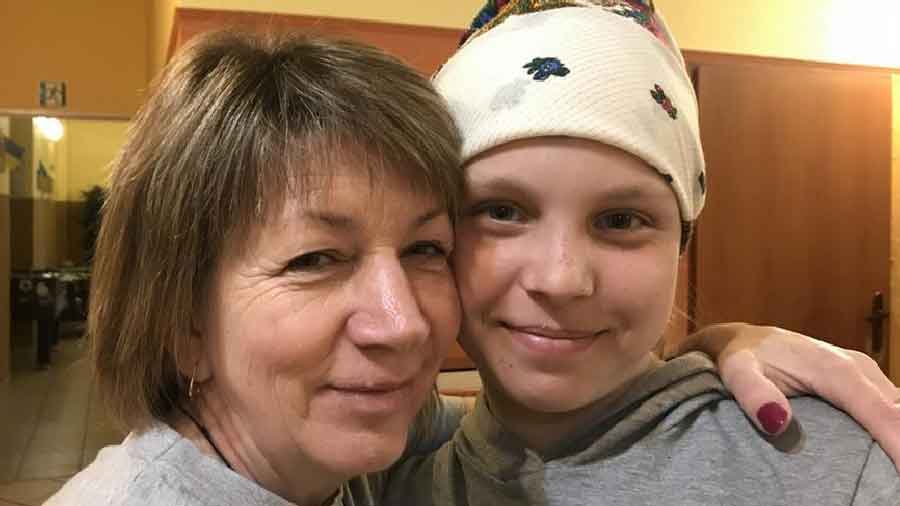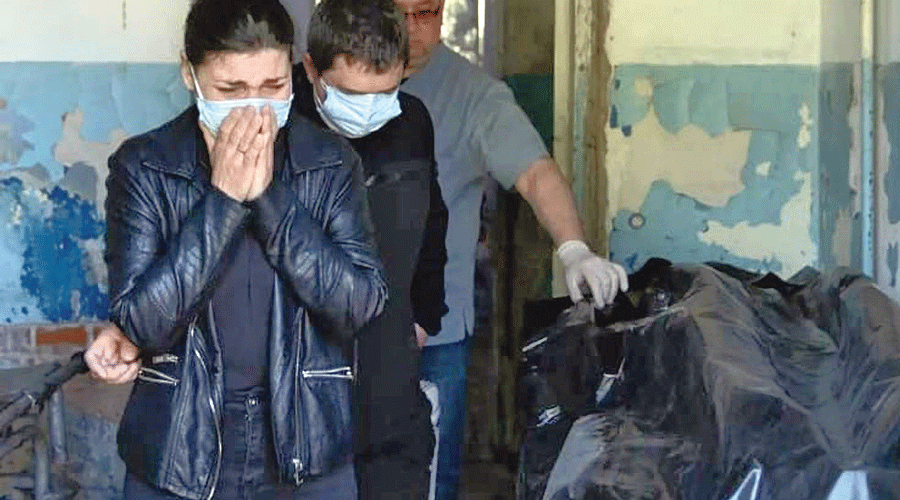More than 4,000 children from Ukrainian orphanages and care homes have been evacuated to Poland to escape the war. Separated from their parents or abandoned, they're coming to terms with trauma.
It's been a while since this children's home in the Polish city of Lodz has seen so many people. In late February, only a handful of Polish children called it home. But since Russia launched its invasion of Ukraine on February 24, they've been joined by dozens of young refugees who fled two care homes in the western Ukrainian town of Kovel.
In the afternoons, the courtyard is filled with the sounds of children riding bicycles and small scooters back and forth. But when they hear the sound of 14-year-old Kira's voice from the ground floor window, everything becomes quiet.
"I went to music school for five years. After completing this school year, after the ninth grade of primary school, I wanted to begin my training as a choir conductor so that, one day, I could lead my own church choir. I want to teach children to sing," she told DW.
But the war has shattered her dreams for the time being. One day soon, she hopes to return home to start her studies. But for the moment, she has to cope with her new reality.
Fleeing the fighting
Kira is one of the oldest children in the group of Ukrainian refugees, old enough to help look after the smaller children alongside their guardian, Galina Jovik. The 50-year-old managing director of the orphanage in Kovel said evacuation was necessary, to keep the younger ones safe.
"Every two hours at night we were awoken by air raid sirens, and we had to go to the basement. Every time, we had to wake up the children, get them dressed, then bring them back upstairs, undress them and put them back in bed. That was difficult. We ended up deciding to just spend the night in the basement," said Jovik.
But after spending two nights in the basement with the children, kept awake by the wailing sirens, Jovik accepted the offer from Ukraine's Social Policy Ministry to evacuate the children's home. She also took her 6-year-old grandson, Artyom, with her; Jovik's daughter, like her brother, are both in the military.
Now safe in Lodz, Jovik is looking after a group of 20 children aged 3 to 16. They have been joined by a second group, 21 children with disabilities from another home in the Kovel region.
Swift evacuation
Their housing was organized by the NGO Happy Kids, which has been caring for orphans and foster families in Poland for 20 years. It also has an extensive network in Ukraine.
"We contacted our Ukrainian partner organizations and the Ukrainian authorities right away, at the beginning of the war," said Przemyslaw Macholak of Happy Kids. "So far, we have evacuated a total of 1,500 Ukrainian children to Poland and placed them in 10 different homes."
"If this tragedy continues, there will be more and more children who will lose their parents in this war," added his colleague Izabela Kartasinska. "We will try to help these war orphans as well."
More than 4,000 children given shelter
Amid social reforms over the last two decades, Poland has been trying to close down its large children's homes. As a result, almost 80% of Polish children in social care have been moved to live with foster families — leaving space in the care homes for Ukrainians.
"We have been fighting for 20 years to get rid of these huge facilities. The fact that they are now filling up again is a joke of history, but fortunately, it's for a good cause," said Kartasinska.
In the meantime, the Polish authorities have also stepped in. Since mid-March, all children from Ukrainian care homes and orphanages must be registered at a center created solely for this purpose in Stalowa Wola, some 150 kilometers (90 miles) from the border with Ukraine. From there, they are sent across the country to former children's homes and convalescent centers.
To date, more than 4,000 Ukrainian children have found safety in Poland. Since most of them crossed the border without their legal guardians, Poland has set up a form of temporary guardianship, which must be assigned within three days.
Children in shock
At the children's home in Lodz, those who are old enough attend a Polish school, though Jovik makes sure they also have lessons in Ukrainian. She hopes they'll be able to return home soon, but until then a familiar daily routine is important to ease the shock of war.
"The most important thing is to tell the children the truth. They feel our nervousness, our tension," said Jovik. "The problems shouldn't be hidden, because the children don't like being deceived. They will never forgive you for that."
Nevertheless, she said, she didn't tell the youngest children about the war when they were evacuated, just that they were going on holiday to meet new friends.
Praying for freedom
For the older children like Kira, however, the war is very much on their minds. "I'm afraid that the war will go on," she said. With tears in her eyes she added that she can't find the words to speak about what's happening in eastern Ukraine, where "Russians are shooting and killing small children."
Every day, she prays and sings for peace, giving voice to the Gospel of Matthew: "Blessed are the peacemakers, for they will be called children of God."
"We will survive all the battles," said Kira, firm in her belief that Ukraine will prevail. "We are a peaceful people, and it is not us who started this war."
From Deutsche Welle Newsfeed












